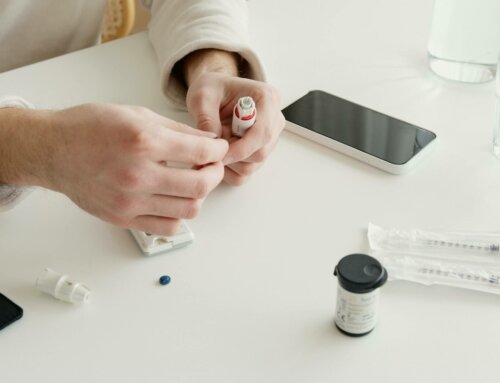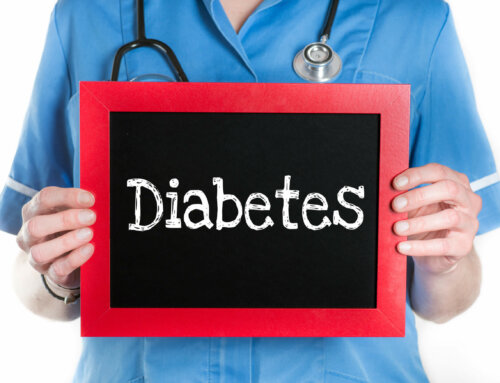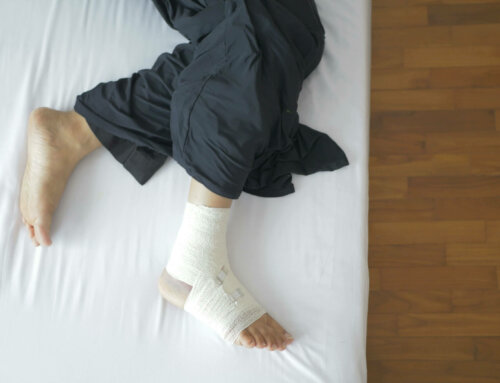It is easy to understand why your blood sugars spike high after eating 2 or 3 sugar coated donuts when you have diabetes. Too much empty sugar from cookies, candy and pies lead to elevated numbers. With diabetes you do not have the insulin needed to regulate your blood sugars. Unfortunately, there are many other unsuspecting reasons why blood sugars go up or down. The best way to avoid these swings is by becoming a “blood sugar detective”. Next time your blood glucose readings seem off, see if you can figure out which situations lead to the high or low readings. Learn what to do before, when or after it occurs.
What Can Affect Your Blood Sugar?
Having a Cold or the Flu
Believe it or not, a simple cold can have an effect on your blood sugars. Add more serious conditions such as the flu, a urinary tract infection, stomach bug, sinus infection, bronchitis and even an infected ingrown toenail, can make blood sugars soar. Each of these medical maladies cause stress and inflammation in the body, leading to higher levels of the hormone cortisol. More cortisol circulating in the blood stream causes blood sugars to rise. The hormones released to fight the infections make blood sugars higher.
You may get an elevated glucose before any actual symptoms of illness. This can be an early warning sign of a brewing infection, so take notice. Taking OTC remedies for your cold or flu also can raise blood sugars as many OTC products contain high amounts of added sugar and/or alcohol.
Surgery and Diabetes
Having surgery can put added stress on the body from anesthesia and the actual operation. Post-operative hyperglycemia is common after surgery for those without diabetes and even more prevalent when you have diabetes. Catecholamines (hormones) or neurotransmitters are released into the blood stream when you are physically stressed which causes insulin resistance. Elevated blood sugars after surgery lead to delayed healing and a higher rate of post-op infections. Insulin resistance (not using your insulin efficiently) makes arteries and veins stiff and less flexible which restricts blood flow.
Taking steroids, like Prednisone, for inflammation and swelling before or after surgery usually causes high blood sugars. Pain from the surgery can lead to elevated glucose. High blood sugars after surgery can lead to kidney problems, fluid and electrolyte imbalances, heart and lung issues, Ketoacidosis in type 1 diabetes and possible stroke or death, if not treated.
What to do to improve blood sugars when you are ill or having surgery:
- Always discuss sick day plans post-surgery with your doctor before it happens.
- Get tight control over blood sugars prior to surgery.
- Look for signs of infection after surgery which could lead to elevated sugars, such as oozing, redness, streaking, fever, pain, or swelling.
- Keep track of your weight after surgery. Weight gain can be due to excess fluid build-up and weight loss can occur from fever-sweating, vomiting or diarrhea. Healing may be more difficult.
- Consult with your physician if you need to stop taking Metformin/SGLT-2s prior to surgery. These medications may cause lactic acidosis. Only stop and or resume taking medications under the guidance of your physician before or after surgery. Never make this choice on your own.
- Perform blood sugar tests frequently, every 3-4 hours, and document. Look for trends. Alert the physician when sugars reach 240mg/dl and start testing ketones at 250-300mg/dl. Report ketone levels to your physician. You may need to go to the ER if ketones are moderate/high, which can lead to Ketoacidosis.
- Take diabetes medications as prescribed. Never double up on medications to bring down sugars.
- Be prepared for when you get sick. Talk about sick day plans before it happens. If you have stomach troubles, can’t tolerate eating, are vomiting or have diarrhea, have foods and fluids on hand which contain carbohydrates to help prevent lows or hypoglycemia. Stock up on clear broths with sodium, crackers, applesauce, Jell-O, popsicles or puddings, and drinks with electrolytes such as Gatorade. If blood sugars remain high during an illness, drink plenty of sugar-free beverages and have sugar-free Gatorade to restore electrolytes. Keep sugar-free popsicles ready in the freezer and diet Jell-O. Having the proper nutrition when you are sick is extremely important for healing and recovery.
- Make sure to have OTC remedies that are sugar-free and diabetes friendly. Watch out for blood pressure friendly medications, too. Pseudo-ephedrine can relieve congestion but raise blood pressure. Some OTC cold and cough syrups have, “19 grams of carbs per ounce and 10% alcohol”.
- When appropriate, eat foods you can tolerate. Stick to whole grains, low-fat dairy, lean proteins and fresh fruits and vegetables. Eating whole simple foods can help you recover faster.
- Start back with low levels of physical activity as soon as you are released by your physician.
- Monitor blood sugars more frequently until you are completely healed.
Emotional Stress and Diabetes
Nothing can do a number on your blood sugars like emotional stress. Anger, fear, anxiety, excitement, and tension can play havoc with your glucose numbers. It could be work stress, having trouble in school, taking care of an older parent, moving, or money troubles. Even “happy stress” like a job promotion, getting married or a vacation can have the same effect on blood sugars. The body reacts with an increase in “fight or flight” hormones when the body is under attack. Stress hormones cause the liver to secrete stored glucose back into the bloodstream. Without sufficient insulin to get the glucose into the cells, the blood sugar rises. Emotional stress can simply make you eat more, drink excess alcohol and just sit on the couch, instead of exercising – this all raises blood sugars.
What can you do to help your stress?
Everyone experiences stress, but you need to learn how to deal with it and not get bogged down. You can work on how you respond:
-
- Avoid obvious personal triggers. Each person has their own set of triggers, but some annoyances seem to be universal. An example would be being stuck in daily, heavy traffic on a specific road when you need to be somewhere else. Try to find an alternate route, use apps that track traffic patterns and give you better road choices. Learn what your triggers are.
- Test blood sugars to look for patterns of what upsets you. When you see blood sugar elevations after the same problem, you will learn to avoid them.
- Ask and find out about talk therapy. It could be with a co-worker, family member or professional who can give you techniques on how to handle your stress.
- Read self-help books dealing with life’s stresses.
- Simple things like getting a manicure, massage, practicing meditation or deep breathing will be helpful to lower stress levels.
- Exercise uses up blood sugar in addition to being an excellent stress reducer.
Speaking of Exercise
You probably think that exercise will always lower your blood sugars. Exercise helps with blood sugar control by improving insulin sensitivity and using up blood glucose. One aerobic session of walking, swimming, biking or dancing can lower your blood sugars for up to 24 hours. Waiting too long between workouts can cause blood sugars to rise again. Combining aerobics, with stretching, balance and weight training exercises is the best combination for optimal blood sugar control. The best time to exercise is 30-60 minutes after a meal when the blood sugars are generally higher.
Then why would my blood sugar go up after exercise?
Strenuous exercise can sometimes increase blood sugars afterwards, especially in people with type 1 diabetes. Activities like sprinting, heavy weightlifting, playing hockey, lacrosse, ice skating or playing basketball are all considered strenuous exercises with short bursts of energy. The extra demand placed on your muscles causes the release of adrenalin, which then makes the liver push out excess glucose into your blood stream for added energy. If you do not have enough insulin to counteract the glucose, as in diabetes, then the blood sugars will go up. You should not exercise when blood sugars are running at 250mg/dl or above since this is already stressful to your body.
Why would it plummet after exercise?
Too much exercise without a source of glucose can make blood sugars go down causing hypoglycemia. Symptoms of shaking, sweating, feeling weak, headaches, blurry vision can occur if low blood sugar is not treated.
What you should do if your numbers are high?
Talk to your physician about testing more frequently and finding patterns if you do engage in these types of exercise. Also find out about changing insulin doses or delivery systems such as an insulin pump and/or continuous glucose monitors if you find you are frequently having high readings after you exercise.
What if my numbers are low?
Apply the “rule of 15”: chew 15 grams of a carbohydrate such as glucose tablets and wait 15 minutes. If blood sugar is still below 70mg/dl, repeat and follow with a small snack of carbohydrate and protein. Have a small snack prior to exercise to combat lows.
My sleep was awful last night
A poor night of sleep can mess with blood sugars the very next day. Restless nights are a form of chronic stress. Cortisol levels go up when you are deprived of good sleep. Try to get back to a regular sleep cycle as soon as possible. Make sure you are evaluated for sleep apnea if you or a family member suspects it.
If nothing seems to help after making the traditional positive nighttime changes such as a cool, dark room, eating a small snack like a protein and a carbohydrate 30 minutes before bed, taking a warm bath 30 minutes prior to bed, getting rid of electronics two hours before bed, then talk to your health care provider for help. Restful and sound sleep is when your body recovers from the day and you need it to stay healthy.
The list goes on – so continue to play detective for other uncommon reasons:
-
-
- Did I skip any of my diabetes medication? Did I just forget to take it or run out of it?
- Have I had too many artificial sweeteners today? Even though it is sugar-free, it may raise blood sugars in certain people.
- How has my eating been? Hidden sugar in foods including processed foods, packaged foods, fast foods, condiments, BBQ sauce, spaghetti sauce and salad dressings can increase numbers.
- Did I leave my glucose meter in the car under extreme temperatures? Did I wash my hands before I tested? You could have inaccurate results due to heat or humidity, or sticky, greasy substances on your fingers.
- Is it really hot outside? Extreme heat is a body stressor.
- Am I dehydrated? Simply being dehydrated or short on fluids can elevate blood sugars.
- Menstrual cycles? The week leading up to your monthly menstruation can cause big swings in blood sugars.
- Somogyi effect? Also called “rebound hyperglycemia” blood sugar levels drop in the middle of the night and your body compensates by the liver releasing more glucose resulting in numbers being higher in the morning. More common in type 1 diabetes.
- Dawn phenomenon? Your body churns out extra glucose between 3:00-8:00AM to get ready for next day. Blood sugars can be higher in the morning. This is more common in type 1 diabetes.
-
There are so many reasons blood sugars can go up or down that may be unfamiliar or surprising to you. It can be very frustrating if you think you are doing everything right and the glucose numbers do not match. The more you know, the better you can be prepared for these sudden changes. Always involve your health care provider if you are unsure or if the numbers do not change after you have made several adjustments.







Leave A Comment